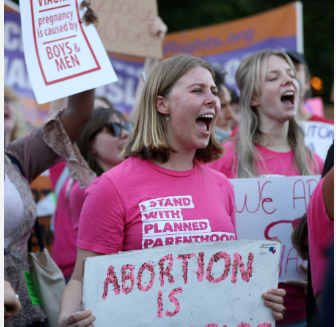How Abortion Became an ‘Achilles Heel’ for US Republicans
Abortion has long been a contentious and divisive issue in American politics, but recent developments have thrust it into the spotlight, revealing how it has become an “Achilles heel” for the Republican Party. Over the years, the Republican stance on abortion has solidified, aligning with conservative and religious values. However, changing demographics and shifting public opinion have posed challenges for the party, forcing Republicans to navigate a complex landscape.
Even former President Donald Trump — who has prided himself on having appointed three justices to the Supreme Court that overturned Roe v Wade — has acknowledged privately that Republicans are “getting killed on abortion”, according to US media reports.
Historically, Republicans have been largely united in their opposition to abortion rights. The party’s platform has advocated for stricter regulations, supporting measures such as bans on late-term abortions and defunding of organizations that provide abortion services, most notably Planned Parenthood. This staunch anti-abortion stance has appealed to conservative voters and religious communities who consider abortion to be a moral issue.
⇒Join us on Telegram for more Sure and Accurate football-winning tips every day...click here
However, recent years have seen a significant shift in public opinion, particularly among younger Americans. Polls indicate that a growing number of Americans support abortion rights and believe that women should have the right to make decisions about their own bodies. This changing landscape poses a challenge for Republicans, as their anti-abortion stance may alienate a substantial portion of the electorate, especially among women and young voters.
One major factor contributing to the complexity of the abortion issue is the Supreme Court. The appointment of conservative justices, including the most recent confirmation of Justice Amy Coney Barrett, has raised concerns among abortion rights advocates that the landmark ruling of Roe v. Wade, which legalized abortion in 1973, could be overturned or significantly weakened. This possibility has energized pro-choice activists and galvanized support for Democratic candidates who vow to protect abortion rights.
The Republican Party’s stance on abortion has also been tested by internal divisions. While the party’s platform officially opposes abortion, some Republican lawmakers have expressed more moderate views on the issue, recognizing the need for exceptions in cases of rape, incest, or when the life of the mother is at risk. These divisions within the party can create challenges in presenting a cohesive and unified message, leading to political vulnerabilities.
Moreover, the issue of abortion has increasingly become intertwined with broader discussions on women’s rights and healthcare. Critics argue that restrictive abortion policies disproportionately affect marginalized communities and restrict access to essential reproductive healthcare services. This connection has further mobilized women’s rights activists, who view the Republican Party’s anti-abortion stance as an attack on women’s autonomy and bodily autonomy.
As the 2024 presidential election approaches, the Republican Party faces the delicate task of balancing its traditional anti-abortion stance with the need to appeal to a wider electorate. The outcome of this balancing act could have profound implications for the party’s electoral success and its ability to attract diverse voter demographics. It remains to be seen how Republicans will navigate the increasingly complex terrain of abortion politics and whether they will be able to find common ground that satisfies both their conservative base and a changing American electorate.
Democrats ‘benefitted’ from Dobbs
By the midterm elections in November, voters in five more states favoured protecting abortion rights through ballot proposals — including in Kentucky, a Republican stronghold.
Michigan, a swing state that voted for Trump in 2016, also approved a referendum to enshrine abortion rights. Democrats, emphasising abortion rights, comfortably won the three top state-wide races in Michigan last year and gained control of the legislature for the first time in years.
And it was not just in Michigan. In key midterm races, Democrats who made abortion a key issue emerged triumphant, leading the party to a historically good performance nationwide, despite rampant inflation and economic concerns.
Undem said the Dobbs ruling definitely boosted Democrats’ prospects at the polls in 2022.
“There’s no question that it was a setback [for Republicans]. I mean every indicator, from every ballot measure where people voted on it, every poll pre- and post-election, including our own, showed that Democrats really Benefitted from the Dobbs decision and abortion being a top issue,” she said.
In a rapidly evolving political landscape, the issue of abortion has become an “Achilles heel” for US Republicans. The party’s historically steadfast opposition to abortion rights is facing challenges from shifting public opinion, internal divisions, and the changing demographics of the electorate. How the party addresses these challenges will play a crucial role in shaping the future of abortion policy and the Republican Party itself.




